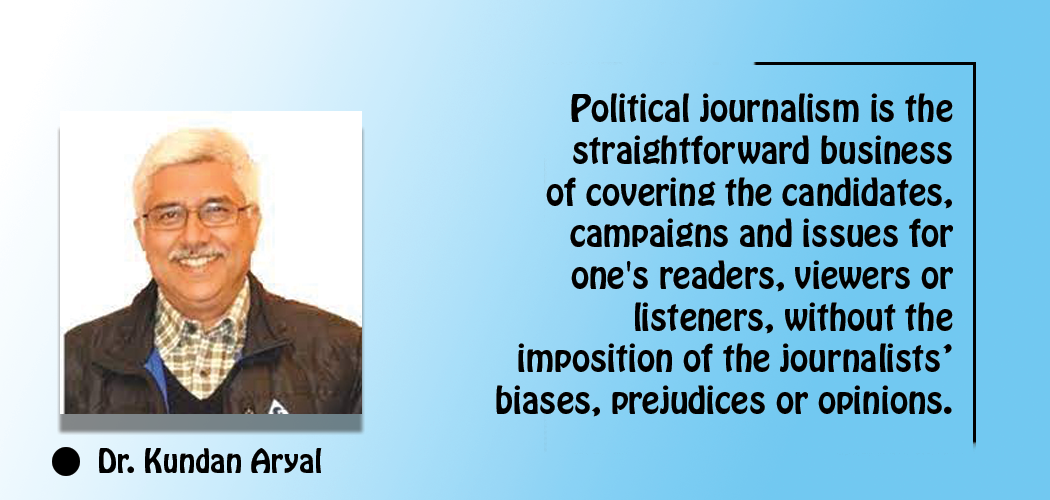- Sunday, 1 March 2026
Political Reporting During Elections
Dr. Kundan Aryal
Nepali people are going to cast their votes in another local poll today after the country adopted the federal system. The much-awaited voting followed massive campaigns of the political parties and candidates and 48-hour silence period. The mass media, despite their regular role of surveillance of the political activities, are expected to abide by the directives meant for electoral silence. Hence, in principle, the electorates are supposed to decide peacefully based on the information they acquired earlier from the different media outlets and their own observations.
It is believed that the media have presented electoral choices before the voters who listened to the views and visions of candidates before making up their mind as to which party or candidate they are going to vote for. The objective of the silent period is to avoid undue pressure on the voters and potential tension that can lead to even violence. Thus, all forms of poll campaigns – canvassing in person or using social media platforms to persuade voters and publish any news content that intends to solicit votes or promote election campaigns were officially prohibited.
Conducive atmosphere
The Election Commission (EC) has been monitoring the compliance of election code of conduct enforced since a month to create atmosphere conducive to free, fair and peaceful polls. Many a time media could be abused as the potential means to induce violent communication during the elections. Thus, the mass media institutions, journalists and communicators also need to follow poll code of conduct. Ethical, professional and balance role of the media is a must to ensure a free, fair, and fearless environment for voting. Hence, reporting especially during the elections requires skills, professional wisdom and integrity as well.
The media should create an enabling environment for free, fair and peaceful elections. The election silence is considered an important aspect of electoral process and provides voters with a peaceful moment to make a final decision independently. There is high hope that the electorates are now well-informed and can make wise decisions in a peaceful environment. Since the constitution and the laws ensure information pluralism and freedom of media, it could be assumed that the voters are able to make an informed choice.
Maintaining fairness in political reporting requires a higher level of ethical sensitivity and role above the partisan interests. Rob Armstrong, an US media correspondent, wrote after his retirement that informing the public and delivering the news may result in a type of influence that manifests itself in the form of re-examined, reinforced or changed views, but that's not the objective of the reporting itself. He argues, in his work Covering Politics: A Handbook for Journalists, that political journalism is the straightforward business of covering the candidates, campaigns and issues for one's readers, viewers or listeners, without the imposition of the journalists’ biases, prejudices or opinions. He said it's the same basic stuff that applies to any journalistic endeavour. Free and fair elections are not only the basic foundations of democratic societies. It is equally important to sustain free media because an outcome of unfair elections would impede the way for the free media and harshly impact media systems and their subsequent relations to the democratic process. The people, who are going to be elected to the governing bodies, are going to affect the lives of the electorates and media people as well.
Therefore, following the norms of silence period contributes to the healthy democratic as well as a media system. Over the period, the Nepali media knowingly or unknowingly have tried to reveal the truth and a clear and lively impression about different political issues which would help the electorates to form their opinions.
Informed choices
In his seminal work, Freedom of Speech, Professor Eric Barendt argues that freedom of speech is essential for citizens to make informed choices between parties in general elections. The role of the news media as a conduit of information about what politicians are doing and how it matters in citizens' lives is crucial. The role played by the Nepali media in this regard could be a matter of review in detail in the future. However, for the moment the news media are generally contributing to creating an atmosphere for information pluralism.
The role played by a section of the Nepali media has been appreciated as they provided platform for the dissemination of information before the last 48 hours of the poll. At the same time, the partisan role on the part of journalists has made the audience skeptical. Nepali journalists in general need to take lessons from this election as well acquire a special dimension of the profession to carry out their activities in a professional, fair and balanced manner.
(Dr. Aryal is associated with the Central Department of Journalism and Mass Communication of Tribhuvan University.)
















